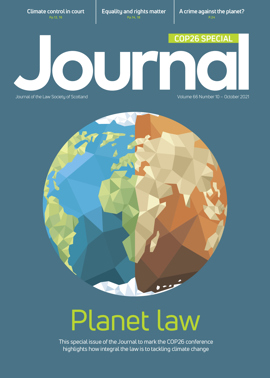“Stand up!” for children’s rights in the climate crisis
In November, the world is coming to Scotland.
Whether in person or online, all eyes will be on Glasgow for the UN Climate Conference. We are all surrounded by images of the devastating impacts of climate change and the talk of it as “the biggest threat… modern humans have ever faced”.
In the face of that threat, children are making demands. One young climate activist recently told the Commissioner that we must all “Stand up!... and let the people in charge know that the planet is worth saving for future generations and wildlife.”
Recognising that “a safe, clean, healthy and sustainable environment is the foundation of human life,” the UN Commissioner for Human Rights, Michelle Bachelet, recently stressed that, “because of human action – and inhuman inaction – the triple planetary crises of climate change, pollution, and nature loss is directly and severely impacting a broad range of rights, including the rights to adequate food, water, education, housing, health, development, and even life itself”.
Rights to protest
Children are answering the call to stand up to “the people in charge”, by leading climate justice movements in the streets, online, and in court. In particular, the global climate school strikes have reinforced the chilling reality that the climate crisis is also a critical children’s rights crisis.
All this is happening against a backdrop of the throes of a global pandemic, where the most profound effects have been felt by some of the most vulnerable communities. Existing inequalities have been exacerbated, meaning, as the UN warns, that “for children caught at the apex of this crisis, there is a genuine prospect that its effects will permanently alter their lives”.
Mitigating the risks of further injustice is crucial. Through protesting, in person or online, children are exercising their autonomous rights to participation, and to freedoms of expression, thought, conscience and religion, privacy, and association and peaceful assembly: collectively, their rights to protest. They are letting the world know that the planet is worth saving.
These rights are not absolute. Human rights law recognises that restrictions may be justified in particular situations, but any interference must be in conformity with the law, in pursuance of a legitimate aim, temporary, and necessary in a democratic society. Limitations on the exercise of children’s rights to protest may exist for their protection, in certain circumstances, but they must be proportionate, for example to fulfil the child’s right to be protected from harm under UNCRC article 19.
Participating in protests is part of children’s broader rights to education (UNCRC articles 28 and 29), to develop an understanding of human rights and a respect for the natural environment.
Legitimate controls
So, what will this mean for children and young people protesting at COP26?
Protection from harm during protests must be balanced with the obligations to facilitate protest, to educate police and other officials on children’s rights, to encourage children to form associations, and to refrain from requiring parental consent to join associations. Children must not face discriminatory attacks, reprisals for peaceful protest, nor be silenced, discouraged, or punished, including in educational settings or the criminal justice system.
There is a real concern that children aged between 12 and 17 may face criminal sanctions, including being deprived of their liberty, in the adult justice system. This is incompatible with the UNCRC, the UN Committee on the Rights of the Child General Comment 24, and with Scotland’s policy commitment to a welfare-based, human rights approach, for all children: A Rights-Respecting Approach to Justice for Children and Young People: Scotland’s Vision and Priorities (2021).
How can we be sure children know what their rights are and how to exercise them in the climate crisis?
Despite rights-based commitments by public bodies, including provisions in the education curriculum, implementation is lacking, and children have told us they need better climate education and human rights education, in line with obligations under UNCRC article 29.
Police Scotland has assured children that officers will continue to engage with and support them to raise their voices on the need for urgent climate action ahead of, throughout, and beyond COP26. It has stressed that consent-based policing “has an important role in facilitating peaceful protest and demonstration. Successful policing is human rights in action… and Police Scotland is committed to enabling people to make their voices heard”.
Lasting legacy
As Scotland welcomes the world, we must all seize the opportunity to stand up for children’s rights and create an environment that supports peaceful protest, promoting and facilitating children’s meaningful participation in finding longlasting solutions to this crisis. Their request is simple: the legacy of COP26 must go beyond November 2021.
“Give us a seat at the table where decisions are being made about our futures and our lives. And if bureaucratic structures mean that’s not possible, then it’s time for a new table. One where everyone has a voice, no matter their age.” (Young Human Rights Defenders Action Group, Scotland)
Children are rights holders. They are human rights defenders. They deserve a place at the table in Glasgow.
Regulars
Perspectives
Features
Briefings
- Criminal court: ID from CCTV
- Criminal court: Justiciary Office briefing
- Licensing: Passport to confusion
- Planning: COVID and NPFD update
- Insolvency: Winding up easier, but hurdles remain
- Tax: Government continues to bring in new taxes
- Immigration: Asylum from the Taliban?
- OPG: Update
- Property: Common parts – a welcome clarification
- In-house: Lawyer with natural energy







